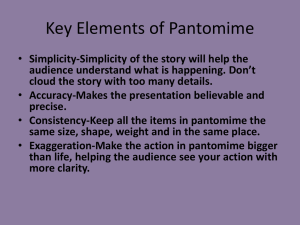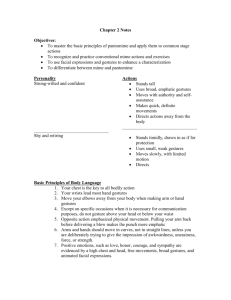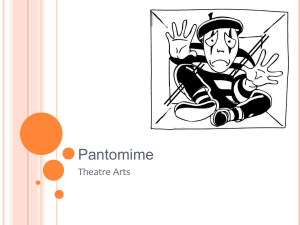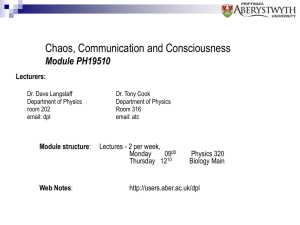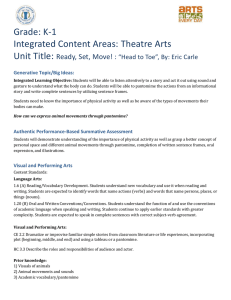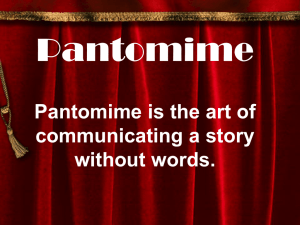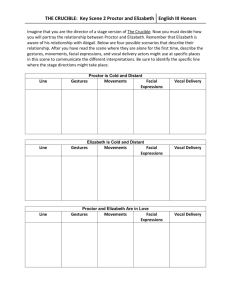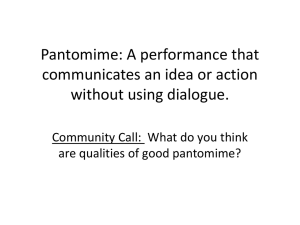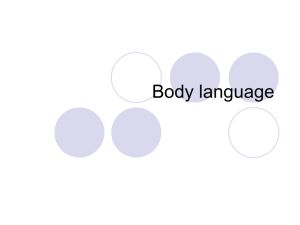Pantomime
advertisement
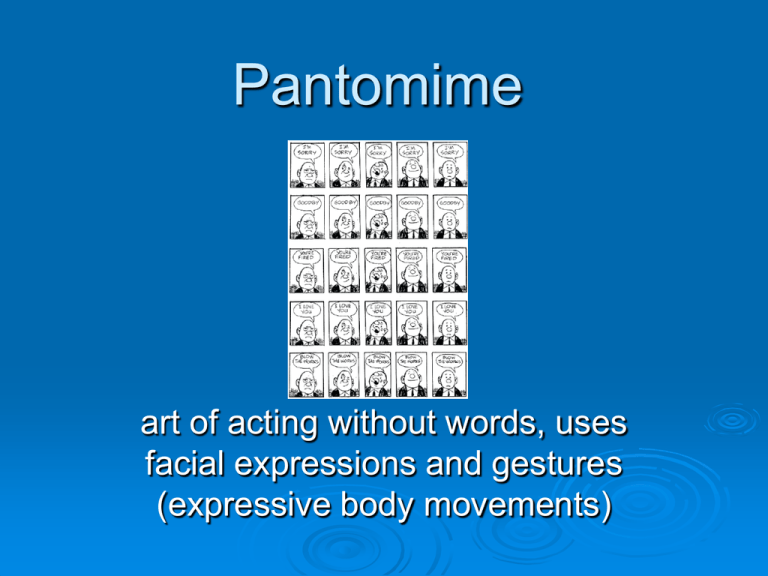
Pantomime art of acting without words, uses facial expressions and gestures (expressive body movements) Importance to Acting the audience will notice your body movement on stage before you speak it is the basis to acting, you must do more than speak words on stage characters are portrayed and identified by movement, facial expression, gestures Actions and Personality strong-willing confident personality • stands tall, broad gestures, definite movements, actions away from the body shy personality • drawn in, small gestures, slower movements, actions down and towards body Facial movement and emotion Surprise: wide eyes, brows lift, mouth in a O Happy: eyes squint, brows lift, mouth curves up Sad: narrow eyes with lids dropped, outer brow turns down, mouth turns down Anger: eyes narrow, brows furrowed, mouth twisted down, lips curl out and down into a sneer, jaw drops and sets firmly Body Language Basics Chest is the key Wrists lead most hand gestures Elbows away from body and arms not above head or below waist (some exceptions) Opposite action will emphasize a physical movement (pulling back before a stage punch) arms and hands in curves, unless deliberate for a particular character (straight lines will portray awkwardness, force, uneasiness, or strength) Body Language continued… high chest and head with free movements, and broad gestures can be evidence of love, honor, courage, sympathy contract and twist of the body and a shrunken chest, tense movements, restricted gestures can be evidence of hate, greed , fear, suffering make gestures with your upstage arm all actions must be clearly motivated (plan them out) Activity! Practice pantomiming different people in different situations Don’t just stand or sit, use your facial expression too Make us think you really are that person Objects Practice with a real object first You must portray the size, shape, weight, resistance, texture, placement, and condition (temp., senses, motion) of the object (s) Use your hands, whole body, head movements Preparation Be Observant: pay attention to how people walk and what that says about their personality Practice with the real object and notice the size, shape, resistance, texture, placement, and condition; memorize how you handle the object Have a detailed mental image of the objects and the setting Think before you move, thought occurs before an action Be simple and clear Keep open and visible to the audience Every movement should make sense with your character, everything must be justified Plan! Practice! Mime vs. Pantomime Pantomime: imitation of real life/based on reality, exact, imaginary objects used, no sound Mime: abstract and stylized, a greater meaning is conveyed, the action conveys the theme, a part of the body can become an object, nonverbal sounds can be used (telephone busy signal, horn honking, screech of tires), beyond reality Objectives Ticket out the door: Write each in your own words Students will understand and demonstrate the basics of pantomime, such as, facial expression, body movement, personality, and observation. Students will use a range of emotional, psychological, and physical characteristics and behaviors to portray believable characters through improvisation and pantomime. Students will act in an ensemble to create and sustain characters that communicate with an audience. Students will create scripts based on personal heritage, imagination, and literature through improvisation and pantomime. Homework Pantomime an everyday activity Examples: making a sandwich, curling your hair, making dinner Practice at home with the real objects Performance needs to be at least 1 minute long Make us believe that the object is really there Sources The Stage and The School Theatre: Art in Action http://smg.media.mit.edu/people/Judith/Th esis/Pix/ThesisPix/eisner.1.100.small.gif http://www.topnews.in/files/facialexpressions.jpg http://www.cartoonstock.com/newscartoon s/cartoonists/rma/lowres/rman815l.jpg
